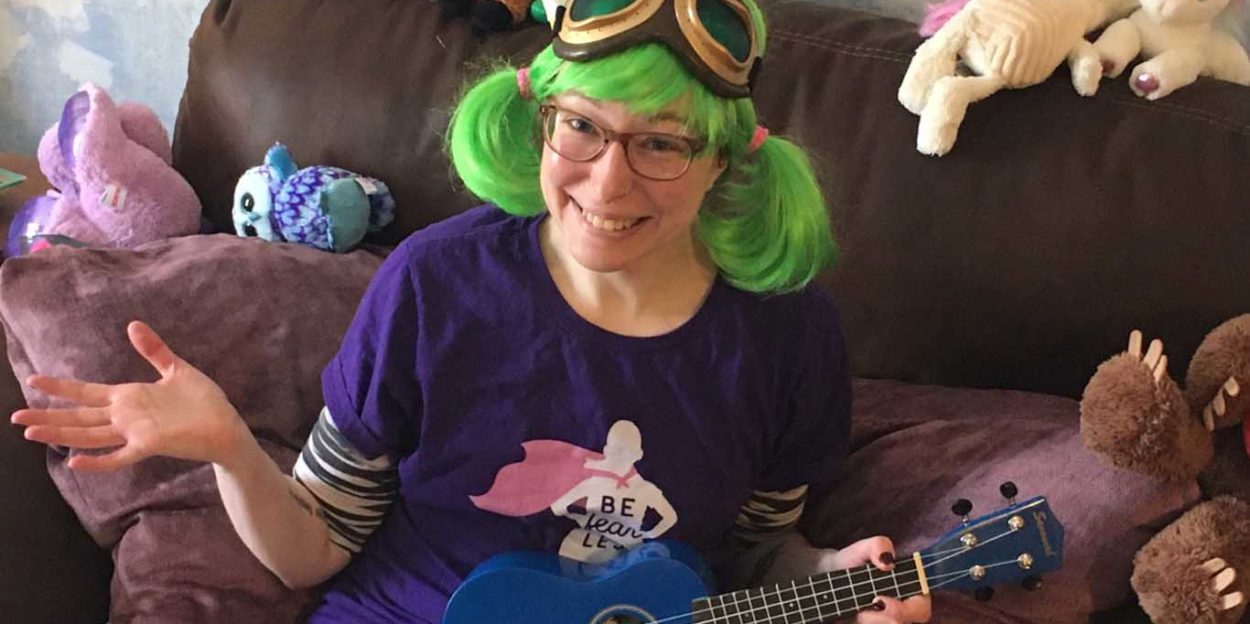Finding new purpose and fulfillment during self-isolation
A Kindle tablet propped up on a stool in an unfinished attic in Northwestern Vermont recorded Miss Flora’s debut on March 12, 2020. For the Facebook Live premiere on @ThePolkaDotPlayground, Miss Flora dressed as a unicorn. Dressing up is important. An early April show was devoted to dress-up—during which Miss Flora donned a superhero cape, sequined tutu, and imaginary fair wings.
Miss Flora sings, dances, reads stories, and plays the ukulele in a half-hour, Facebook Live children’s show twice a week. She is full of energy, information, and creativity. No one would ever think Miss Flora lives with neuroendocrine cancer.
“I feel like crap, and I am doing it anyway,” said Flora Whitmore, a 34-year-old children’s librarian who went into self-isolation in early March.
Not one to cope with boredom, Whitmore decided to do something to protect her sanity. Since it was what she enjoyed most about her part-time job at the library, she decided to take story time online.
Whitmore’s Facebook Live show, The Polka Dot Playground, has given structure, purpose, and focus to her COVID-19 self-isolation. “It makes me feel good, takes my mind off being sick. After I’ve had a few productive hours, I tell myself, ‘now you can rest,’” she said.
This “cancer-friendly format,” as she calls it, allows her to crawl into bed after a show. There are days when she doesn’t want to get out of bed and wonders if she can do it again. But she finds motivation and inspiration from the photos and videos people send her of children singing and dancing along with Miss Flora.
Life before neuroendocrine cancer
Three years ago, Whitmore worked as a music therapist. She traveled to many different schools and settings on an average day to treat children of every age and ability. Beyond her career, she was involved in music, theater, and the performing arts. After months of chemotherapy, it was hard for Flora to keep all those balls in the air.
“Everyone knew I was sick; I looked eight months pregnant with ten pounds of fluid in my belly. I was very thin, and my face was gray, but no one knew what was wrong,” said Whitmore.
During treatment for stage four, pancreatic neuroendocrine cancer with liver metastases, Whitmore took a year off from work. In addition to chemotherapy, she received peptide receptor radionuclide therapy and somatostatin analog injections. She has endured significant pain, symptoms, and side effects from her inoperable functional neuroendocrine tumors.
Miss Flora helps families cope with the pandemic
Miss Flora wears a green wig with two pigtails: a pair of adventure goggles rest just above her bangs. “I thought the wig was a good idea because I wasn’t sure what was going to happen with my hair,” said Whitmore, anticipating more chemotherapy. The continuity of the character is central to developing a rapport and relationship with her audience, according to Whitmore, so children are willing to accept information from her.
Miss Flora is spontaneous, but she is not random. Whitmore strategically applies her training as a music therapist to present intentional messages to children and parents. “You can take the therapist out of the therapeutic setting, but you can’t take the therapist out of Flora,” said Whitmore. “Anytime I do music, my training comes in.”
After singing the wake-up song in the dress-up episode, which involves wiggling your hands, arms, shoulders, elbows, and face, Miss Flora invites viewers to say, “It’s really great to be me. I love my hair. I love my face. I love my outfit. I’m feeling good today,” followed by a round of self-applause.
The therapeutic objectives are even more apparent in Miss Flora’s show on emotions, during which she coaches viewers to identify emotions from facial expressions in a storybook she reads to the camera. She starts and ends the episode with tips on how to use a hand-made emotion wheel to show someone what you are feeling when you can’t find the words.
The Polka Dot Playground is as much for parents as it is for children. “All kids watching the show are experiencing some level of collective trauma that is impacting them,” said Whitmore. “No one is prepared for this. Parents are not equipped to regulate their kids’ emotions for this amount of time.” In addition to the tools used in her shows, Whitmore also populates the Polka Dot Playground Facebook page with tips, resources, and jokes for adults.
Being ready for whatever
Miss Flora wears adventure goggles on her head to be ready for anything in her semi-improvised show to model the essential life skills of flexibility and resiliency. “You have got to be ready for anything the road throws up in your face,” said Whitmore. Clearly, with or without her cape, goggles, and green hair, this is advice Flora Whitmore lives by even in the most trying of times.

